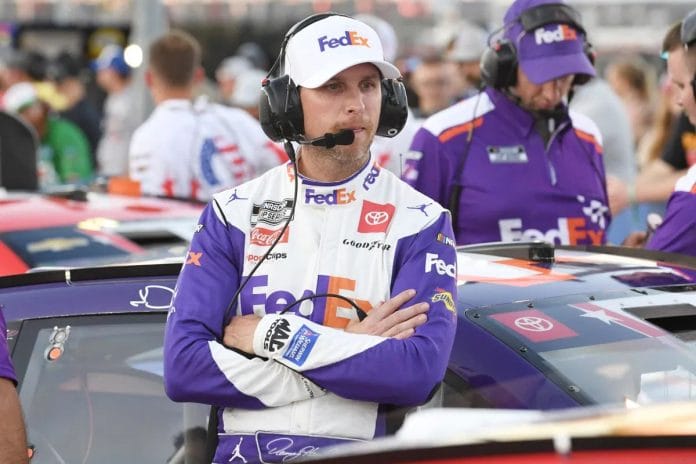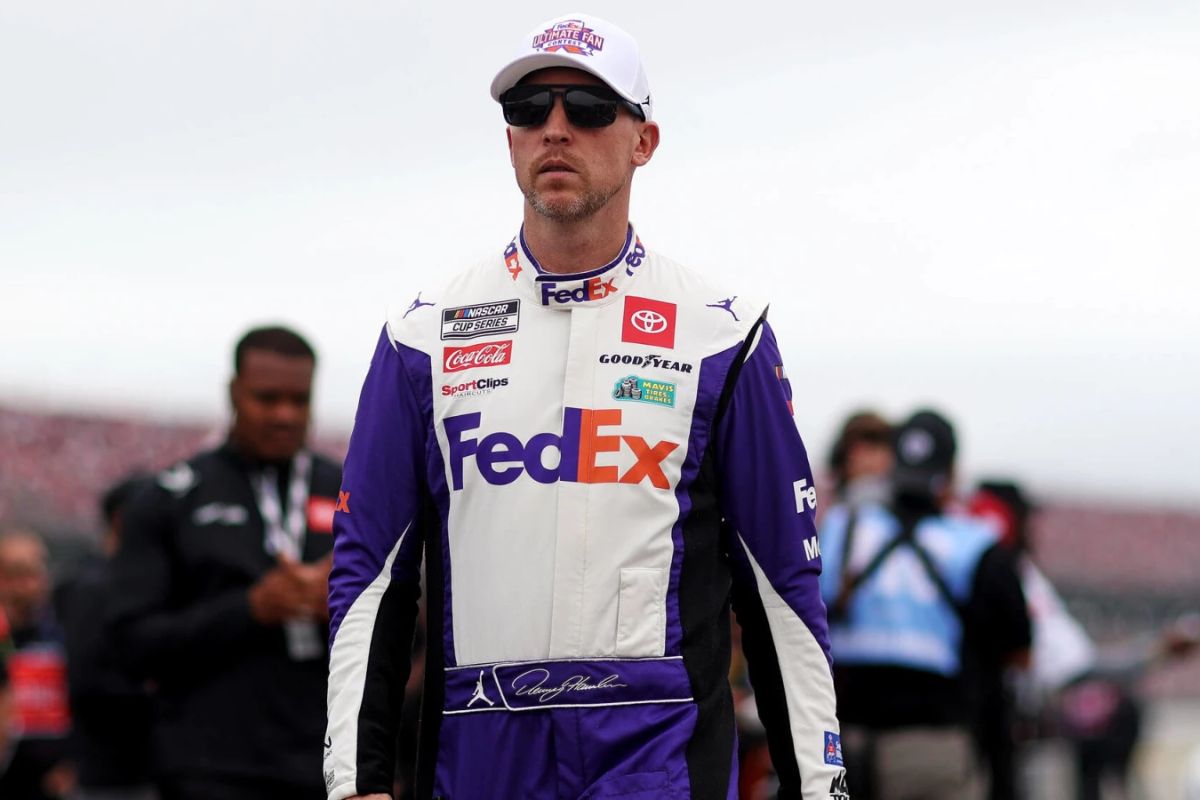Denny Hamlin Rages Against NASCAR: Denny Hamlin‘s recent comments regarding NASCAR’s stringent enforcement tactics, particularly in the context of Chase Elliott‘s situation, shows a broader concern about the balance between regulation and the essence of competitive spirit. By questioning the rationale behind such corrective measures, Hamlin highlights the potential consequences for trust and fellowship within the sport. His perspective invites a critical examination of NASCAR’s governance strategies, prompting a necessary dialogue about the future of racing conduct and the preservation of its integrity.
Key Highlights
- Denny Hamlin criticizes NASCAR’s enforcement methods, citing Chase Elliott’s case as an example of overly strict governance.
- He argues that NASCAR’s heavy-handed penalties compromise fairness and integrity in the sport.
- Hamlin emphasizes the need for a balanced approach to penalties that respects competitive spirit.
- His remarks highlight concerns over NASCAR’s slow response to incidents affecting race integrity.
- The call for accountability reflects a broader desire for improved sportsmanship and ethical conduct in NASCAR.
Denny Hamlin’s Reflection on Past Mistakes
Denny Hamlin’s recent reflections on his past mistakes reveal a nuanced understanding of the competitive nature of NASCAR and the complexities of racing psychology. In examining his actions during the 2017 Martinsville incident with Chase Elliott, Hamlin acknowledges the impulsive decisions that often accompany competition. This candid self-assessment exemplifies a broader theme in racing: the tension between aggressive tactics and ethical conduct.
At Martinsville, Hamlin’s choice to bump Elliott was representative of the fierce desire to win that can cloud judgment. While he initially attempted to deflect responsibility by attributing the collision to external pressures, Elliott’s immediate rebuttal highlighted the importance of accountability. Hamlin’s retrospective view recognizes that such actions can have lasting repercussions, not only on the individuals involved but also on the sport’s integrity.
Moreover, Hamlin’s willingness to offer his experiences as a learning tool for NASCAR emphasizes a commitment to the evolution of the sport. By confronting his past mistakes, he opens the door for dialogue about the necessity of reform in racing behavior and penalties. This level of introspection is vital, as it fosters an environment where competitors can thrive while adhering to the principles of fair play.
Hamlin’s Remorse and Call for Change
It is evident that reflection often leads to a deeper understanding of the consequences of one’s actions, especially in the high-pressure environment of NASCAR. Denny Hamlin’s recent admission of remorse highlights the evolution of his perspective regarding his past behaviors, particularly his 2017 incident involving Chase Elliott. Initially defensive, Hamlin now recognizes the immaturity of his actions and the potential ramifications they could have on the sport.
I think that there’s some incidences that have happened in the past that probably, you know, if this is a new precedent, it could fall under those, I think. For instance, when I spun out Chase Elliott 2017.” – Hamlin
Hamlin’s call for change is not merely a personal revelation; it serves as a broader appeal for accountability and sportsmanship in NASCAR. As he articulates his desire for a more principled approach, several key themes emerge:
- The importance of accountability in competitive environments.
- Empathy as a product of personal experience and understanding.
- The necessity for NASCAR to establish a clear precedent against reckless driving.
- The impact of individual actions on the collective reputation of the sport.
- A call for leadership within NASCAR to foster an environment of respect and integrity.
NASCAR’s Delayed Response and Policing Approach
NASCAR’s delayed response to incidents during races has sparked considerable debate regarding its policing approach. Unlike other motorsport series that assert authority in real-time, NASCAR’s tendency to take measured, often protracted responses raises questions about the efficacy and timeliness of its regulatory framework. Denny Hamlin has pointed out that quicker decisions are not only straightforward but vital for maintaining competitive integrity. His comments underscore the expectation that officials should act decisively to uphold the sport’s standards.
“It’s just an easy call, it really is an easy call. But you [NASCAR] have to give the people in the tower [Broadcast team] liberty to do it. And hopefully, we’ve created new precedent.” – hamlin
The delayed decision-making process, particularly noted during the Richmond race, is purportedly aimed at ensuring fairness across the board. However, the underlying rationale may inadvertently compromise the immediacy and impact of race regulation.
“It’s just a matter of, that’s one where you need to really, you know, put your foot down and say we’ve got to police the sporting aspect of this at that point.” – hamlin
While the intent is to foster an equitable environment for all participants, the execution appears sluggish, potentially undermining the competitive spirit that NASCAR seeks to promote. Hamlin’s call for a more proactive stance reflects a desire for a policing approach that prioritizes immediate action without sacrificing fairness.
As the dialogue continues, it is crucial for NASCAR to strike a balance between fairness and the necessity of prompt enforcement, ensuring that the sport remains competitive and engaging for both participants and fans alike.
Concerns Over Policing and Entertainment Value
Concerns surrounding the policing strategies in NASCAR extend beyond regulatory effectiveness to encompass the very essence of the sport as a form of entertainment. The balance between maintaining competitive integrity and guaranteeing fan engagement has become increasingly tenuous, as enforcement measures risk overshadowing the cultural traditions that define racing.
The “bump and run” maneuver, a staple of racing lore, exemplifies the difficulty in delineating acceptable contact between competitors without stifling the excitement that fans anticipate.
The current NASCAR Cup Series format, highlighted by the Playoffs, has transformed racing into a spectacle that prioritizes entertainment value. However, this shift raises critical questions about the sustainability of the sport’s authenticity and the potential erosion of its core values. Insights from industry veterans like Mark Martin underscore the precarious nature of this balance.
“In a lot of ways when you bring in the big money, you have to provide entertainment. And that’s what, Sunday night was entertaining to me, but race-wise I don’t approve of that.” – Martin
- The risk of alienating traditional fans who value racing’s competitive spirit.
- The potential for increased examination on driver interactions, leading to less aggressive racing.
- The challenge of preserving the sport’s cultural heritage amid commercial pressures.
- The necessity for NASCAR to define clear boundaries that improve rather than hinder the spectacle.
- The importance of maintaining a dynamic, unpredictable environment that captivates audiences.
“I know people are really worried about well we don’t wanna stop the contact, you’re not going to. We’re still going to push the edge to try to get the guy out of the groove to win the race.” Hamlin
In this evolving landscape, NASCAR must navigate the delicate interplay between regulation and entertainment to secure that the thrill of the race remains intact, safeguarding not only its popularity but also its legacy.
Hamlin’s Vision for Racing Conduct
A prevailing sentiment among drivers and fans alike is the need for a return to pure racing conduct, free from excessive manipulation and tactics. Denny Hamlin highlights that racing must remain fundamentally about skillful maneuvering rather than tactical trickery. The recent spike in on-track incidents, exemplified by the 32G recorded during his race, serves as a clarion call for introspection within the NASCAR community.
Hamlin articulates a vision where the integrity of racing is preserved, asserting that while contact is an inherent aspect of the sport, it should not devolve into reckless behavior. The expectation is for drivers to acknowledge the ramifications of their actions and for NASCAR to uphold consistent regulations.
“It’s not going to be worth just cleaning someone out that you know deservingly was going to win the race, which is the fair part of the sport.” – Hamlin
The responsibility is on both drivers and NASCAR to maintain this vision. Drivers must engage in self-regulation to avoid unnecessary collisions, while NASCAR needs to provide clear, consistent rulings to strengthen confidence in its governance. As Hamlin concludes, the essence of the sport lies in fair competition, where the deserving victor is celebrated rather than overshadowed by controversial tactics. This commitment to integrity will not only improve the racing experience but also safeguard its legacy.
News in Brief: Denny Hamlin Rages Against NASCAR
Denny Hamlin’s critique of NASCAR’s punitive measures highlights the importance of a more judicious approach to enforcement within the sport. The focus on heavy-handed penalties may compromise the core of competitive integrity and diminish the general entertainment value of racing. A reevaluation of governance practices is crucial to foster trust and respect among drivers and fans alike, ensuring that the spirit of fair competition prevails in NASCAR’s evolving landscape.
ALSO READ: Denny Hamlin Secures FireKeepers Casino 400 Pole Position After Rain Cancels Qualifying




